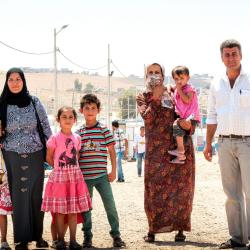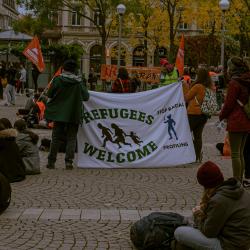Global crises, conflicts and emergencies require expertise and engagement across the collegiate university, together with voices of those affected. Whether the Taliban takeover of Afghanistan or the Syrian refugees in Europe, these situations have illustrated difficulties of understanding crises, mitigating their effects at home and abroad in terms of politics of humanitarian aid, disrupted education, refugee arrivals or more broadly understanding conflicts in context.
This project engages with crises, conflict and emergencies and its human consequences, whether in terms of immobility or mobility. Our focus is on:
- Conceptual engagements with the framework questions of empire, liberalism and decolonisation of knowledge within which crisis and displacement can be (re)configured, problematized and analysed, leading to a difference in policy and practices.
Global governance, knowledge, decolonization
Integrating area studies perspectives into our knowledge production and diffusion provides an important lens, if we conceive of area studies no longer as the expertise about others, but as a representation of voices from different areas of the globe. Our intent is to bring voices of those historically marginalized as objects of research to the forefront of research, policy and practice. This requires acknowledging a diversity of voices as well as the need for translations not only in words, but also concepts for productive dialogues. Our focus will be knowledge, crisis and displacement.
Regional/country desks
We emphasize ‘voices’ from the countries/ regions, combining this with interdisciplinary expertise across Cambridge. We are also developing cross-cutting expertise, again with involvement of area-specialists, on education and public health. These desks will facilitate research collaboration across disciplines, but also allow for quick reaction capability to unfolding crises as to brief media and policymakers, as well as inform the collegiate university.
Global networks of policy and practice, including the UN Global Compact on Refugees and UN Global Compact on Safe, Orderly and Regular Migration (relevant links are already existing), but also national and European policies.
Workplan
This workplan consists of three components:
- research & teaching (with networks through study groups);
- impact & practice (with networks through region/country desks and emphasis on voices of those conflict-affected/diasporas);
- publications and policy.
All three components will be supporting each other.
Co-production of knowledge takes part place under impact and practices, supported through collegiate university expertise under research and teaching, and leading to transformative and out-of-the-box thinking for publications and policy.
In 2023-24, we plan to:
- produce first research outputs
- small grant applications
- establishment of partnerships in/to conflict and displacement regions.
In 2024-25, our focus will be on:
- large grants applications on knowledge, conflicts and displacement (covering multiple study groups, regional desks and external partners through cross-cutting topics)
- philanthropic opportunities for individual regional desk and their work for displacement affected-populations.
- co-production of nationally and globally relevant policy directives (such as through the Forum on Afghanistan).
Project benefits
This project contributes in the first instance to “area studies, global inequality and economic development”, but equally has strong links to decolonization of knowledge and legacies of past. It also has links to conflicts, climate justice, transformations, technologies.
SHSS has so far been missing a focus on crises/emergencies and displacements – particularly in relation to refugees. This project not only anchors this subject area, but creates research, teaching, policy and practice links across the School, the collegiate university, and into global academic and policy networks. It does so not by replicating other centers across the world (focused, for example, on refugees), but by taking decolonization of knowledge seriously in engaging with conflicts and displacement.





